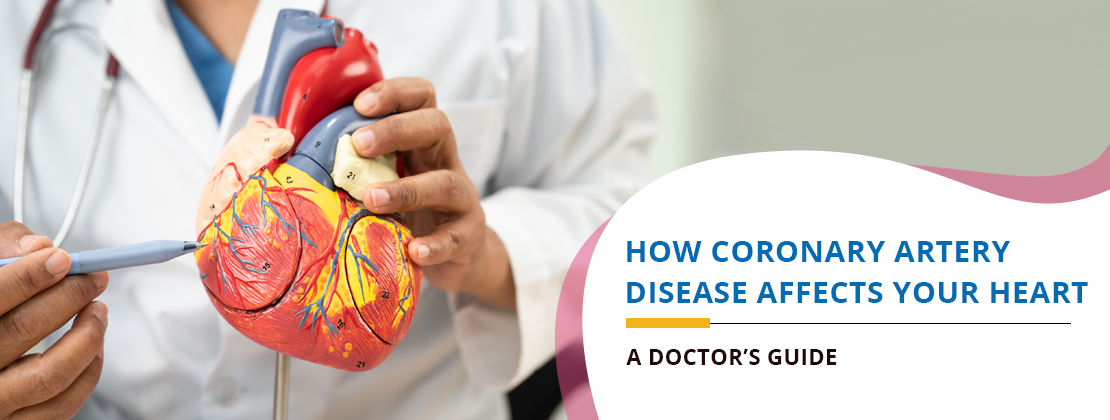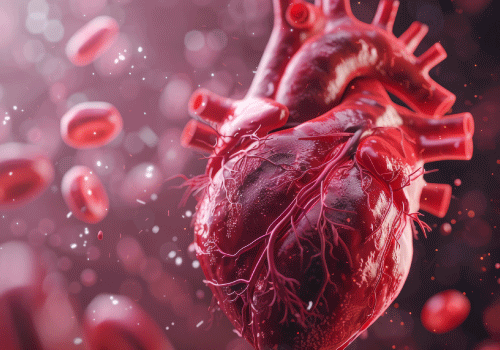
Home / Blog / How Coronary Artery Disease Affects Your Heart: A Doctor’s Guide
Table of Contents
Coronary artery disease (CAD) is a leading cause of heart problems worldwide, which could turn fatal without medical attention. Understanding how CAD affects the heart and how early interventions can make a difference is essential for long-term health.
Blood carrying oxygen does not freely move around in the presence of coronary artery disease and heart disease, as it causes various problems, including angina (chest pain), weakness, and heart attack.
If you don’t understand coronary artery disease yet, check out our in-depth article, What is Coronary Artery Disease? Its Causes, Symptoms, Diagnosis & Treatment to get a comprehensive overview of CAD and what it entails.
Coronary artery disease happens when the coronary arteries—vital blood vessels that deliver oxygen and nutrients to the heart muscle—become narrowed or blocked by plaque.
Plaque is made up of cholesterol and fat and hardens with time, reducing blood passage space. This low flow of blood leads to ischemia, wherein the heart does not get enough oxygen for it to function normally, thereby causing coronary heart disease.
If the heart lacks sufficient oxygen and food, it strains, hence becoming prone to eventual coronary artery disease heart attack risk.

The main function of the coronary arteries is to supply the heart muscles with blood that contains adequate oxygen. In turn, this enables the heart to effectively circulate blood in the body.
If the blood vessels remain open, then the organ works well and keeps the blood circulation system healthy. However, when plaque narrows the arteries, blood cannot flow easily, causing a lack of oxygen in the heart muscle. This can lead to increased heart work, which makes it stressed and may ultimately make it weak.
CAD develops slowly and is usually asymptomatic at first. At first, the plaque may appear insignificant, but with time, it leads to significant narrowing of blood vessels.
This reduces the flow of blood, causing pain while doing normal activities, e.g., climbing stairs. Blood clots blocking the artery completely may occur at a very severe stage when one has developed atherosclerosis.
This way, coronary artery disease and heart disease are progressive conditions whereby the heart muscle works harder with increased amounts of plaque buildup.

People with CAD may vary, but common signs include chest pain or angina, as well as breathlessness, tiredness, and occasional dizziness.
For instance, if a person has coronary artery disease, he or she might undergo chest pain or feel that the chest is squeezing after engaging in some physical activity or when one eats too much food.
Angina often feels like pressure or squeezing in the chest, while some may also feel discomfort in their neck, jaw, or arms. One may easily get tired or run out of breath when doing simple chores like walking from one point to another. These signs indicate that blood flow is not sufficient for the heart.
CAD, if not treated, may cause chronic and dangerous cardiac complications.
Weakness of the heart muscle may occur due to reduced flow of blood for a long time, increasing the risk of a heart attack or heart failure.
When heart failure occurs, it means that the heart has turned very weak to pump blood properly. Many problems could follow this, such as fluid buildup in the lungs, swelling in the legs, and constant fatigue.
oronary artery disease equally increases the chances of having arrhythmias, which, when added up with other factors, may lead to total heart failure.

It is important to discover CAD early so that it can be controlled and stopped from getting worse.
If you are frequently panting after routine activities or you see any symptoms of CAD, you must consult a specialist who will carry out a thorough examination.
Diagnosing CAD in its early stages allows for the implementation of lifestyle changes and medication that can help slow down plaque buildup and improve blood flow.
Doctors often typically use various tests, including electrocardiograms, stress tests, etc., for assessing cardiac performance and finding any anomalies. Detecting coronary artery disease early and dealing with it promptly are essential in ensuring continued normal functioning for the long term.

There are several preventive measures you can take to reduce your risk of CAD.
Firstly, focus on maintaining a balanced diet rich in fruits, vegetables, lean proteins, and whole grains while limiting saturated fats and sugars.
Secondly, take part in moderate physical exercises like walking and swimming, which are important in improving the functions of the circulatory system, including that of the heart.
Thirdly, say “no” to smoking because it destroys blood vessels and speeds up plaque formation.
Lastly, you should control stress because high blood pressure associated with chronic stress makes it difficult for one to lead a normal and healthy life. Make sure you go for a medical examination even when you feel okay, especially if CAD is part of your family’s medical history.
The heart is greatly affected by coronary artery disease, which reduces the flow of blood and raises the chances of getting a heart attack, among other problems.
Nevertheless, people can control CAD well and minimise its effects over a long period through awareness and appropriate preventative measures, a healthy lifestyle, regular health check-ups, and early detection.
Taking steps to understand the risk factors and maintaining a heart-healthy lifestyle can go a long way in preventing coronary artery disease and heart disease. In case of any signs or if someone has had a heart-related illness before, they should talk to a doctor about it without hesitating.
HCG Hospitals is one of the best multispeciality hospitals in India, offering advanced cardiac care facilities and expertise. With a dedicated cardiac care department led by some of the best cardiologists in India, we provide comprehensive diagnostic and treatment services to help patients achieve optimal heart health. Our hospitals in Ahmedabad, Bhavnagar, Rajkot, and Hubli serve as centres of excellence for 360-degree cardiac care.